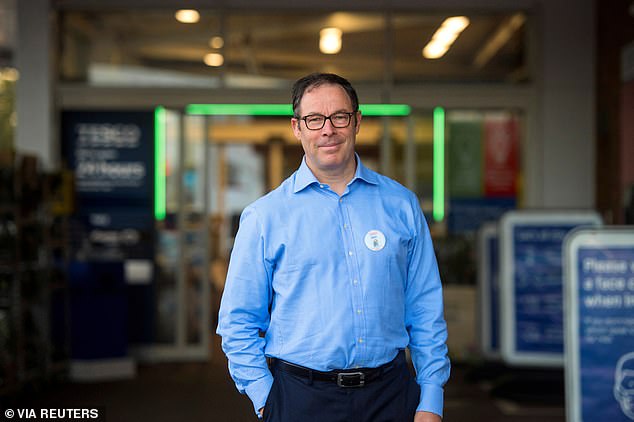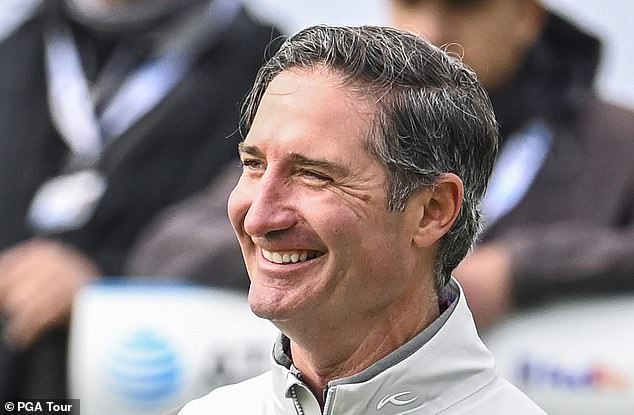UK boardroom income gap widens as Tesco boss Ken Murphy earns 431 times more than the average worker
Tesco is Britain’s most unequal blue chip company, according to an annual audit of executive pay published today by The Mail on Sunday.
Ken Murphy, CEO of the country’s largest supermarket, earned £10 million in 2023, 431 times the amount an average Tesco worker receives. He earned more in a day than the average Tesco staff in the UK earned all year.
The size of the pay gap at the supermarket chain is greater than at other FTSE 100 companies.
Audit: Tesco is Britain’s most unequal blue chip company, The Mail on Sunday’s annual audit of boardroom pay revealed today
Compass, whose boss Dominic Blakemore earned 303 times more than the average catering company worker, came second on the list.
Other employers with a large pay gap between boss and the rest include retailer Sainsbury’s, B&Q owner Kingfisher and clothing giant Next.
The findings form part of The Mail on Sunday’s Fat Cat Files, which charts the millions of pounds paid out each year in salaries, bonuses and benefits to the bosses of Britain’s biggest companies.
The audit shows that in 2023:
– FTSE 100 CEOs were paid an average of £4.7m – an increase of £300,000 on the previous year
– AstraZeneca’s Pascal Soriot was again the highest paid FTSE 100 boss, taking home £16.9m
– The highest paid female FTSE 100 boss was Emma Walmsley at rival pharmaceuticals group GSK on £12.7m
– The number of bosses earning more than £10m has doubled to eight
– Finance directors also did well, pocketing an average of more than £2.2 million each
– The highest paid finance chiefs were Brad Greve of defence giant BAE and Nick Luff at information and analytics company Relx, both on £7.1m
– Nearly a quarter of the FTSE 100’s finance chiefs – often a stepping stone to CEO roles – are now women, raising hopes that women can finally break through the glass ceiling

In the money: Tesco CEO Ken Murphy earns £10m in 2023
Our findings will fuel the debate over ballooning boardroom pay. They come as top companies push for even bigger rewards for their leaders, saying they need to be paid more to compete with US rivals.
According to think tank High Pay Centre, the average CEO of a FTSE 100 company earns 120 times the average salary of his or her employees, but that figure could soon be even higher.
According to consultancy firm Deloitte, sixteen of the 100 largest companies want to revise their remuneration policy.
Nine of the companies have drawn up “radical” plans to increase their bosses’ pay this year, compared with four companies previously.
One of the leaders calling for bosses in Britain to be paid even more is Rupert Soames, chairman of the lobby group Confederation of British Industry.
He has dubbed many companies in the FTSE 100 ‘Brilos’ – ‘British in Listing Only’ – because the majority of their revenues come from overseas.
Soames is also chairman of Smith & Nephew, the medical devices group, where almost half of shareholders voted against plans to give CEO Deepak Nath a huge pay rise.
According to the Fat Cat Files, it was the largest investor revolt at a major company last year.
Julia Hoggett is also leading the battle over CEO pay. The CEO of the London Stock Exchange has warned that a “lack of a level playing field” is leading to a brain drain from the City to New York and beyond.
Shareholders backed plans to more than double the salary of her boss, David Schwimmer, to £13.2m.
Companies including chipmaker Arm Holdings, plumbing giant Ferguson and CRH, owner of Tarmac, have already moved their listings from London to Wall Street, where sky-high executive salaries are more widely tolerated.
The huge sums being offered to top US executives were highlighted this month when Brian Niccol, the new boss of Seattle-based coffee chain Starbucks, was offered a pay package potentially worth more than £78m – with permission to work remotely from California.

American style: Brian Niccol, the new boss of Seattle-based coffee chain Starbucks, has been handed a pay package that could be worth more than £78m
Not all top bosses made their money last year. NatWest’s Alison Rose lost £5.1m after being ousted over the debanking of Reform UK leader Nigel Farage.
But her loss was small compared to Bernard Looney’s at BP, who was cut by £3m in salary and forfeited up to £29m in shares after lying to the board about his personal relationships with other staff.
Tesco defended Murphy’s award. Alison Platt, chair of the remuneration committee, which sets executive pay, said at the time that it recognised “the strong performance of the business” and “the fact that Tesco has delivered for all its stakeholders over the past year”, including “record investment in the reward of colleagues”.
Additional research by Angus Ritchie
DIY INVESTMENT PLATFORMS

AJ-Bel

AJ-Bel
Easy investing and ready-made portfolios

Hargreaves Lansdown

Hargreaves Lansdown
Free Fund Trading and Investment Ideas

interactive investor

interactive investor
Fixed investment costs from £4.99 per month

Saxo

Saxo
Get £200 back on trading fees

Trading 212

Trading 212
Free trading and no account fees
Affiliate links: If you purchase a product, This is Money may earn a commission. These deals are chosen by our editorial team because we think they are worth highlighting. This does not affect our editorial independence.
Some links in this article may be affiliate links. If you click on them, we may earn a small commission. That helps us fund This Is Money and keep it free. We do not write articles to promote products. We do not allow commercial relationships to influence our editorial independence.
